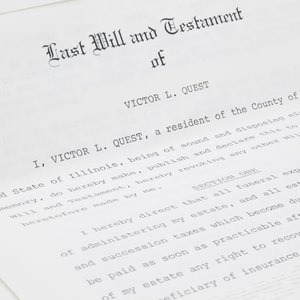
Probate opens soon after death and ends when outstanding debts are clear and the distribution of estate assets is complete. If the estate is small, a will is present and there are no family disagreements, then most states allow a personal representative of the family to handle probate matters without court supervision. In this case, closing probate is a simple matter of informing a county probate registrar that probate is complete by filing the proper paperwork. If probate occurs under court supervision, however, an attorney or family representative must ask for and receive court approval before probate can officially close.
Closing an Informal Probate
Contact your probate attorney or a representative from the probate court to get the appropriate closing statement forms. As an alternative, download and print closing statement forms from your district judicial branch website if your state provides this option.
Read the closing statement form and instructions for completing the form carefully. Gather information you will need to complete the form, such as a listing of outstanding liabilities, if any, that remain against the estate.
Fill out the closing statement form in full.
Sign and date the closing statement form in the presence of a notary public and at the same time have the statement notarized. Include identification information for your probate attorney if you have one.
Make enough copies of the form to send to all the heirs of the estate, as well as outstanding creditors, if any, and keep a copy for yourself.
Mail or deliver the closing statement form in person to the probate court.
Closing a Formal Probate
Contact your probate attorney or a representative from the probate court to get the appropriate petition to close form. As an alternative, download and print the form from your district judicial branch website if your state provides this option.
Read the petition and instructions for completing the form carefully. Make sure to file an inventory and final account statement or beneficiary waiver statements before or at the same time as you file the petition to close a formal probate.
Fill out the petition to close form in full.
Make and distribute copies of the petition to all the heirs of the estate, as well as your probate attorney.
Sign and date the petition to close form in the presence of a notary public and at the same time have the statement notarized. Include identification information for your probate attorney.
Mail or deliver the completed petition in person to the probate court.
Wait for the probate court to schedule a court date to formally close probate. Appear in court on the appointed date and time.
References
- Minnesota Judicial Branch Second District: Estates
- Jonathon B. Alper, P.L.C.: Estate Planning: Probate
- Minnesota Judicial Branch: Self-Help Center-Informal Closing Statement
- Minnesota Judicial Branch: Self-Help Center-Petition to Formally Close Estate
- New York State Unified Court System. "Last Will and Testament." Accessed April 8, 2020.
- Superior Court of California, County of Santa Clara. "About Probate - How to Probate a Decedent's Estate." Accessed April 8, 2020.
- Middlesex County New Jersey. "Surrogate." Accessed April 8, 2020.
- Hawaii State Judiciary. "Circuit Court Filing Fees and Costs," Page 2. Accessed April 8, 2020.
- Middlesex County New Jersey. "FAQ Surrogate - How Can I Get a Copy of a Will?" Accessed April 8, 2020.
- Huber Law Group. "Obtaining Records." Accessed April 8, 2020.
Writer Bio
Based in Green Bay, Wisc., Jackie Lohrey has been writing professionally since 2009. In addition to writing web content and training manuals for small business clients and nonprofit organizations, including ERA Realtors and the Bay Area Humane Society, Lohrey also works as a finance data analyst for a global business outsourcing company.

